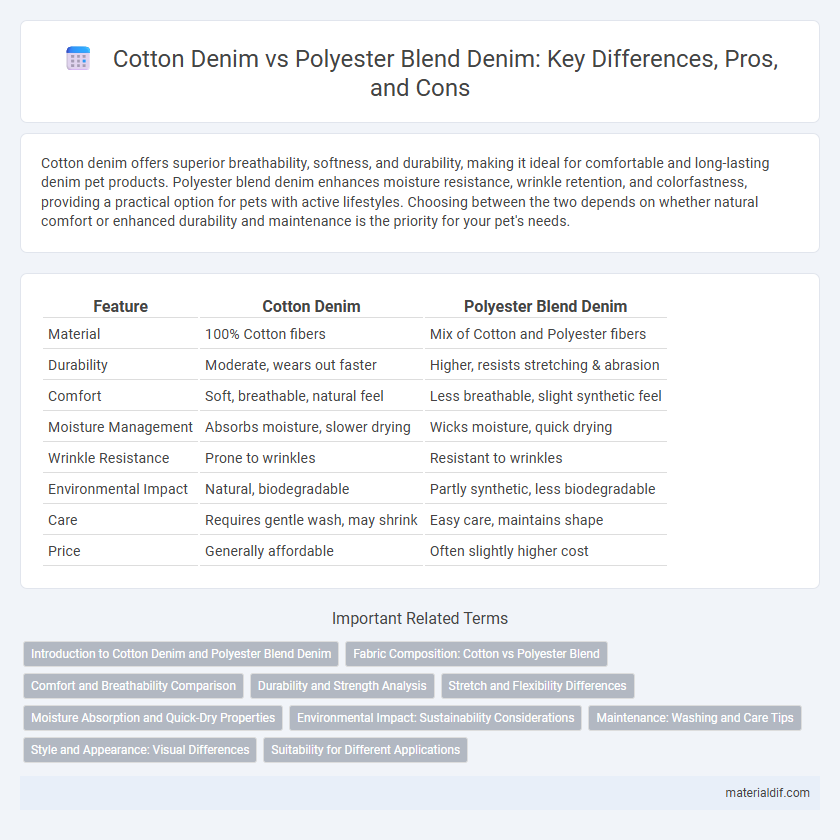Cotton denim offers superior breathability, softness, and durability, making it ideal for comfortable and long-lasting denim pet products. Polyester blend denim enhances moisture resistance, wrinkle retention, and colorfastness, providing a practical option for pets with active lifestyles. Choosing between the two depends on whether natural comfort or enhanced durability and maintenance is the priority for your pet's needs.
Table of Comparison
| Feature | Cotton Denim | Polyester Blend Denim |
|---|---|---|
| Material | 100% Cotton fibers | Mix of Cotton and Polyester fibers |
| Durability | Moderate, wears out faster | Higher, resists stretching & abrasion |
| Comfort | Soft, breathable, natural feel | Less breathable, slight synthetic feel |
| Moisture Management | Absorbs moisture, slower drying | Wicks moisture, quick drying |
| Wrinkle Resistance | Prone to wrinkles | Resistant to wrinkles |
| Environmental Impact | Natural, biodegradable | Partly synthetic, less biodegradable |
| Care | Requires gentle wash, may shrink | Easy care, maintains shape |
| Price | Generally affordable | Often slightly higher cost |
Introduction to Cotton Denim and Polyester Blend Denim
Cotton denim offers natural breathability and durability, making it a popular choice for classic jeans and sustainable fashion. Polyester blend denim incorporates synthetic fibers that enhance wrinkle resistance, elasticity, and color retention, providing improved performance for active wear. Each fabric type presents unique benefits, with cotton denim emphasizing comfort and eco-friendliness, while polyester blends offer increased durability and ease of care.
Fabric Composition: Cotton vs Polyester Blend
Cotton denim is made from 100% natural cotton fibers, offering breathability, softness, and superior moisture absorption, making it ideal for comfort and durability. Polyester blend denim incorporates synthetic polyester fibers with cotton, enhancing fabric strength, wrinkle resistance, and quick-drying properties while potentially reducing breathability. The fabric composition directly impacts denim's texture, longevity, and performance, with cotton providing a traditional feel and polyester blends delivering increased functional benefits.
Comfort and Breathability Comparison
Cotton denim offers superior comfort and breathability due to its natural fibers that allow better airflow and moisture absorption, making it ideal for warm weather wear. Polyester blend denim, while more durable and resistant to wrinkles, tends to trap heat and reduce breathability, potentially causing discomfort during extended use or in hot climates. Choosing cotton denim enhances comfort by maintaining skin dryness and minimizing irritation, whereas polyester blends prioritize longevity over ventilation.
Durability and Strength Analysis
Cotton denim offers superior breathability and natural resilience, making it highly durable for everyday wear, while polyester blend denim enhances tensile strength and abrasion resistance due to synthetic fibers. The inclusion of polyester increases fabric elasticity, reducing the likelihood of tears and extending garment lifespan, especially under strenuous conditions. Industrial tests reveal polyester blends can outperform 100% cotton denim in resistance to stretching and weakening over repeated washes and usage.
Stretch and Flexibility Differences
Cotton denim offers natural breathability and a moderate stretch derived from its fiber structure, providing comfort with limited flexibility. Polyester blend denim incorporates synthetic fibers that enhance stretch and recovery, allowing for greater flexibility and shape retention during wear. The blend's elasticity makes it ideal for active wear and fitted designs, while pure cotton denim is preferred for traditional durability and softness.
Moisture Absorption and Quick-Dry Properties
Cotton denim offers superior moisture absorption due to its natural fiber composition, making it breathable and comfortable for extended wear. Polyester blend denim incorporates synthetic fibers that enhance quick-dry properties, reducing drying time and adding durability. The choice between cotton denim and polyester blend denim depends on the desired balance of comfort, moisture management, and performance.
Environmental Impact: Sustainability Considerations
Cotton denim production typically requires substantial water and pesticide use, contributing to higher environmental footprints compared to polyester blend denim, which relies on synthetic fibers derived from petroleum with lower immediate water consumption. However, polyester blends pose challenges in biodegradability and microplastic pollution, while cotton, especially organic varieties, offers better biodegradability and potential for sustainable farming practices. Evaluating sustainability involves balancing the resource-intensive nature of cotton cultivation against the long-term environmental persistence and recyclability issues associated with polyester blends.
Maintenance: Washing and Care Tips
Cotton denim requires gentle washing in cold water to maintain fabric integrity and avoid shrinkage, while polyester blend denim is more durable and resistant to wrinkling and fading, allowing for less frequent washing. Air drying cotton denim preserves shape and prevents damage, whereas polyester blends dry faster and are less prone to shrinkage. Avoid bleach on both types to maintain color vibrancy and extend garment lifespan.
Style and Appearance: Visual Differences
Cotton denim offers a classic, natural texture with a matte finish that enhances its vintage appeal and soft hand feel. Polyester blend denim often exhibits a smoother surface with a slight sheen, contributing to a modern, polished look and increased color retention. The visual differences impact how each fabric reflects light, influencing the overall style and perception of denim garments.
Suitability for Different Applications
Cotton denim offers superior breathability and durability, making it ideal for casual wear and high-stress activities like outdoor work or heavy-duty fashion. Polyester blend denim provides enhanced wrinkle resistance and moisture-wicking properties, better suited for activewear and garments requiring easy maintenance. Choosing between cotton and polyester blend denim depends on desired comfort, longevity, and specific application needs.
Cotton Denim vs Polyester Blend Denim Infographic

 materialdif.com
materialdif.com